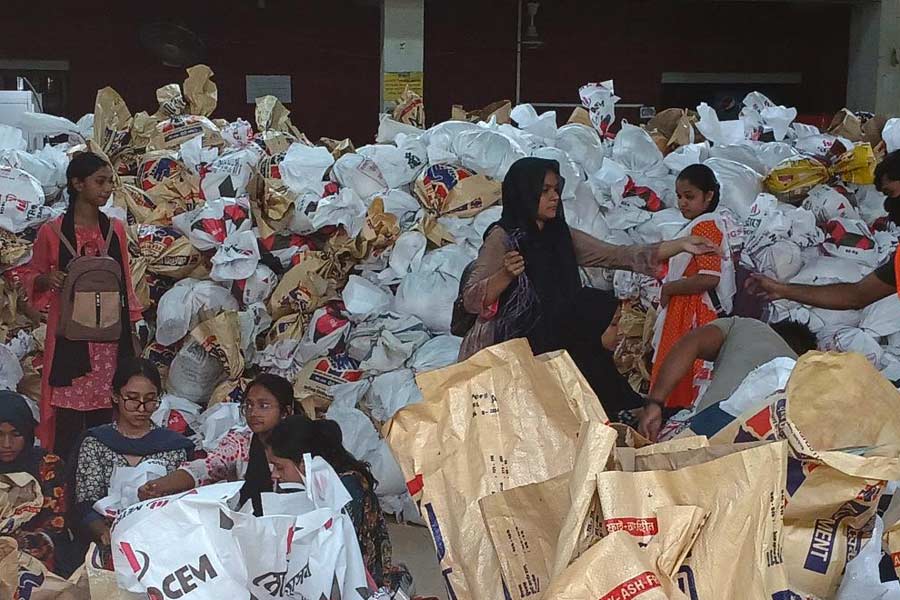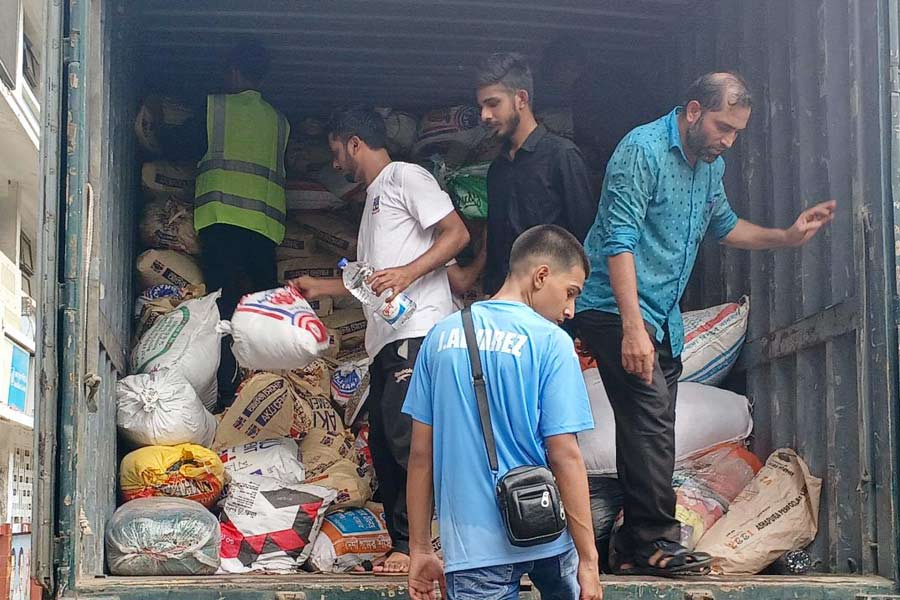In the wake of severe flooding in Bangladesh, the student community, which led the people’s uprising that resulted in the ouster of Sheikh Hasina, is channelling their revolutionary zeal into spearheading flood relief efforts for millions affected by the calamity.
“This isn’t just about relief; it’s about making a difference, just like we did during the Monsoon Revolution,” said Rafiq, a student at Dhaka University, as he and fellow students formed a human chain at the heart of the campus, passing sacks of rice and other supplies hand to hand to load onto trucks bound for flood-stricken regions of Bangladesh.
The student community across Bangladesh has risen to the occasion, demonstrating their ability to lead and mobilise resources in a time of national emergency.
The recent floods, which have claimed several lives and affected nearly 5 million people, have spurred a remarkable wave of student-led relief efforts, transforming their recent revolutionary fervour into a crucial force for recovery.

Students after playing a role in people’s uprising, engage in collection and sending of relief materials for flood victims in Bangladesh. PTI
The torrential rains that triggered the floods have wreaked havoc across 11 districts, including Feni, Chittagong, and Sylhet, and the magnitude of the disaster has overwhelmed traditional relief mechanisms, elevating the role of students to that of primary responders.
In Dhaka, the capital, a surge of student activism has shifted from political protest to flood relief.
Sara Khan, a third-year political science student at Dhaka University, has been a central figure in these efforts.
“Our recent struggles for democracy have proven our ability to effect change,” Khan stated.
“Now, we are channelling that same drive into helping our fellow citizens during this crisis.” On August 5, the student-led Monsoon Revolution under the banner of “Students Against Discrimination” succeeded in ousting Hasina’s 16-year regime, propelled by fervent demands for change and accountability.
The transition from revolutionary activism to humanitarian aid was swift.
Immediately after the floods struck, student volunteers from Dhaka, Chattogram, and nearby areas mobilized to Feni with life jackets, basic food, drinking water, trucks, and speedboats to rescue those stranded, driven by their recent activism and unified resolve despite the absence of formal organization.
Dhaka University (DU), the cradle of the anti-Awami League government movement that dislodged them, is overflowing with relief supplies as hundreds of volunteers work tirelessly to gather, sort, and package donations for dispatch to the flood-stricken areas.
“Till last night, the collection for flood relief was around 7 crores (BDT) and we have sent around 120 trucks of relief materials to the flood-affected areas. Here at Dhaka University, TSC building, we are working round the clock. Now we have a job at hand to save our countrymen from floods,” Rakib Masukh, a student activist who has been at the fund collection centre, said.
The students from medical colleges and nursing schools have also sprung into action, dispatching teams to flood-affected areas to provide medical help to the people.
Monsoon rainfall-triggered floods in deltaic Bangladesh and upstream Indian regions posed a huge administrative challenge to the newly installed interim government amid a political transition.
Several rivers are flowing above the danger mark, particularly in northeastern, eastern, and southeastern Bangladesh, inundating many cities and towns apart from several hundred villages, killing people, damaging infrastructure, and disrupting communication lines.
Masukh and his peers have divided their efforts into teams, with rescue teams navigating through treacherous floodwaters, reaching stranded communities, and providing immediate aid.
The distribution teams handle the transport and delivery of essential supplies such as food, water, and medical kits to ensure timely assistance, while support teams manage relief drives, oversee funds, and collect donations to keep the entire operation running smoothly and efficiently from start to finish.
Using social media to coordinate logistics, recruit volunteers, and share updates, students have amplified their relief efforts, with Rafiq noting that “social media has been key in mobilizing support and keeping everyone informed.” Responding to the students’ call, the community's response has been crucial, with local businesses, shopkeepers, and residents contributing generously, from cash to clothing, and as Zainab Ahmed, a student leading donation drives, put it, “It’s inspiring to see such widespread response.” The student-led initiatives are more than just a response to the flood crisis; they represent a broader commitment to national recovery and rebuilding.
"We’ve demonstrated our ability to drive change in the political sphere, and now we are showing our dedication to rebuilding our country,” Saima, a second-year student at Dhaka University, told PTI. The efforts by the students have drawn widespread commendation from political parties.
Golam Sarwar Milon, the first president of the Bangladesh Jatiotabadi Chatra Dal—the student wing of the BNP—said that the students have shown they have both the zeal to lead a revolution and the capability to shoulder responsibilities in times of crisis.
“The interim government has made significant efforts for relief work in the flood-affected areas. But the way the students have risen to the occasion is commendable,” Milon, who is currently co-chairman of the Jatiya Party (Raushan faction), said.
The students constructed elaborate dam models and staged vivid street plays, with colourful banners and makeshift river replicas drawing the attention of passersby as they enacted scenarios illustrating the impact of the water release, all in a bid to rally for solidarity and raise awareness.
India has described as factually incorrect reports in Bangladesh that the current flood situation in certain parts of the country has been caused by the opening of a dam on the Gumti River in Tripura.
The Indian Ministry of External Affairs (MEA) stated that floods in the shared rivers between the two countries are a "shared" problem affecting people on both sides and require close mutual cooperation to resolve.
Except for the headline, this story has not been edited by The Telegraph Online staff and has been published from a syndicated feed.











